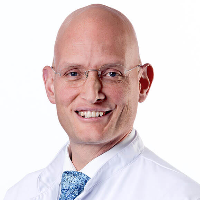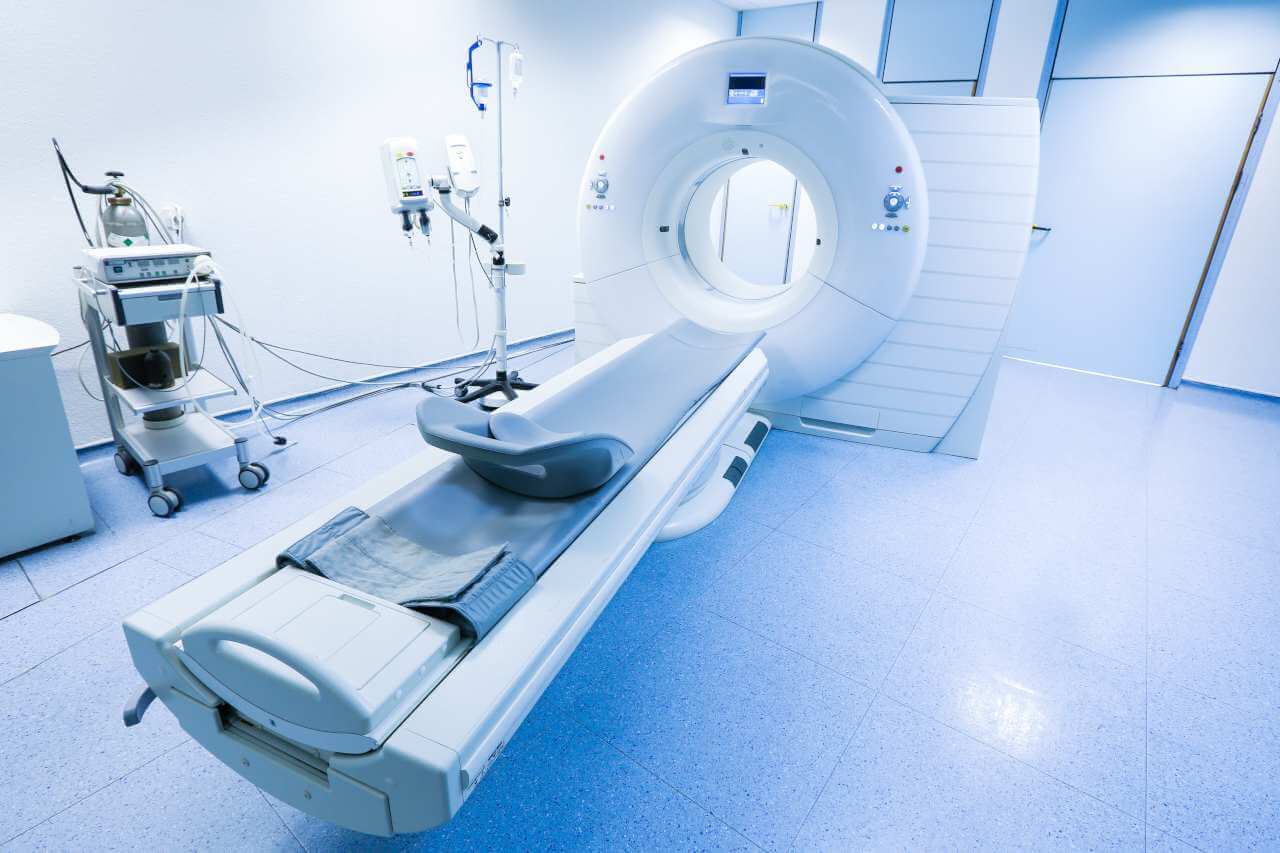
The program includes:
- Initial presentation in the clinic
- clinical history taking
- review of medical records
- physical examination
- laboratory tests:
- complete blood count
- biochemical analysis of blood (lipase, amilase)
- inflammation markers (CRP, ESR)
- blood coagulation analysis (aPTT, PT, INR)
- ultrasound of the abdomen
- gastroscopy with biopsy
- CT/MRI of the abdomen(if clinically indicated, additional cost is 650/1200€)
- nursing services
- consultation of related specialists
- treatment by chief physician and all leading experts
- explanation of individual treatment plan
Required documents
- Medical records
- Abdominal ultrasound (if available)
Service
You may also book:
 BookingHealth Price from:
BookingHealth Price from:
About the department
The Department of Gastroenterology and Hepatology at the Meoclinic Hospital Berlin offers the full range of modern diagnostics and treatment for patients with pathologies of the digestive system. The medical facility specializes in the treatment of esophageal, stomach, bowel, liver, gallbladder and bile duct diseases. The priority clinical areas of the department's work include endoscopic examinations (gastroscopy, colonoscopy, proctoscopy), abdominal ultrasound scanning, as well as drug therapy and endoscopic treatment of gastroenterological pathologies. The department pays due attention to the diagnostics and provision of medical care to patients with gastrointestinal cancers. Colon cancer is one of the most common types of oncology worldwide, so the department's specialists offer a special screening program that allows them to exclude a diagnosis or detect oncopathology in the early stages, which significantly increases the chances of recovery. All doctors in the department have long experience and make every effort to provide the patient with effective medical care. The department is headed by Dr. med. Marc Köppe.
The department is distinguished by its special competence in the diagnostics and treatment of chronic inflammatory bowel disease: Crohn's disease and ulcerative colitis. A specificity of pathologies is that they often affect people between the ages of 15 and 35 years. The exact causes of these diseases are still unknown. Possible causes include genetic mutations, hereditary predisposition, autoimmune processes, psychosomatic disorders and smoking. Confirming the diagnosis of Crohn's disease or ulcerative colitis is a rather time-consuming process, since pathologies are characterized by non-specific symptoms. First of all, the department's gastroenterologists perform fecal occult blood tests and blood tests followed by imaging diagnostics (ultrasound scanning, computed tomography and magnetic resonance imaging). The final stage of the diagnostic process is an endoscopic colon examination; a biopsy with a histological examination of the material obtained is also often performed. If the patient has one of chronic inflammatory bowel diseases, the department's specialists strongly recommend not to postpone treatment in order to avoid the development of serious complications, such as gastrointestinal bleeding and malignant tumors. The department's doctors carry out conservative treatment of Crohn's disease and ulcerative colitis with the help of modern drugs. An integral part of the treatment is lifestyle modification: diet correction, cessation of bad habits, maximum elimination of stressful situations. The surgical intervention is the last-line therapy and is performed by specialized surgeons.
The department's gastroenterologists also successfully carry out treatment of various esophageal diseases. The patients with esophageal varicose veins, gastroesophageal reflux disease, Barrett's esophagus, esophageal cancer, esophagitis and achalasia cardia are within the focus of the specialists of the medical facility. The basis of the diagnostics is blood testing and endoscopic examination (esophagoscopy). To treat esophageal diseases, the department successfully uses drug therapy, endoscopic procedures and a combination of these methods. The optimal treatment regimen is determined by the attending physician on an individual basis with due consideration of a specific clinical case.
Another important focus of the department's clinical practice is the treatment of liver diseases. In this field, the treatment of chronic hepatitis is of particular interest. The pathology most often develops due to hepatitis B and C viruses. Autoimmune diseases with liver lesions and alcohol abuse can also provoke its development. When the patient with suspected chronic hepatitis visits the department, the first task of doctors is to study his anamnesis and conduct a general examination. This is followed by the necessary set of laboratory tests, ultrasound examination and liver biopsy (if clinically indicated). When prescribing treatment to the patient, the department's specialists strive to eliminate the cause of chronic hepatitis and prevent the progression of the pathology. For this purpose, drug therapy is mainly used.
The department also provides medical care to patients with gallbladder and biliary tract diseases: cholelithiasis, inflammatory lesions of the bile ducts or gallbladder. The diagnostic protocol includes laboratory tests, ultrasound scanning, and endoscopic procedures (for example, endoscopic retrograde cholangiopancreatography). The therapeutic options include treatment with modern medications, gallstone fragmentation with the use of ultrasound waves (extracorporeal shock wave lithotripsy). There are often situations when gallbladder removal surgery is required. Such surgical interventions are performed by specialized surgeons, with the use of sparing laparoscopic techniques.
The department's key clinical areas include:
- Gastroenterology
- Diagnostics and treatment of chronic inflammatory bowel disease (Crohn's disease and ulcerative colitis)
- Diagnostics and treatment of irritable bowel syndrome
- Diagnostics and treatment of acute and chronic types of diarrhea
- Diagnostics and treatment of chronic pancreatic diseases
- Diagnostics and treatment of esophageal diseases (esophageal varices, Barrett's esophagus, gastroesophageal reflux disease, achalasia cardia)
- Diagnostics and treatment of abdominal pain of unknown origin
- Hepatology
- Diagnostics and treatment of liver diseases, including chronic hepatitis B and C
- Diagnostics and treatment of gallbladder and bile duct diseases
- Diagnostics and treatment of other pathologies
The department's range of diagnostic and therapeutic services includes:
- Diagnostic options
- Gastroscopy
- Colonoscopy
- Small bowel capsule endoscopy
- Rectoscopy
- Endoscopic retrograde cholangiopancreatography
- Abdominal ultrasound scanning
- Hydrogen breath test for diagnosing fructose and lactose intolerance
- Bowel cancer screening
- Monitoring of patients with chronic bowel disease
- Therapeutic options
- Drug therapy
- Endoscopic removal of stomach and colon polyps
- Endoscopic hemostasis procedures to stop abdominal bleeding
- Other medical services
Curriculum vitae
University Education and Professional Career
- 1995 - 2001 Study of Human Medicine at the Philipps University of Marburg.
- 2001 - 2010 Assistant Physician, Department of Internal Medicine, Military Hospital Ulm.
- Head of the Medical Unit in Roth (Bavaria) and Budel (Netherlands).
- Head of the Outpatient Department at the 420 Sanitary Center in Sigmaringen, as well as Assistant Physician in the Department of Internal Medicine at the Bundeswehr Hospital Berlin.
- Assistant Physician in the Chest Pain Unit at the Charite University Hospital Berlin.
- Assistant Physician in the Department of Gastroenterology, Hepatology and Endocrinology at the Charite University Hospital Berlin.
- 2002 Doctoral Degree.
- 2003 Diploma in Business Economics in Internal Medicine.
- 2003 Emergency Medicine Diploma.
- 2004 Certification in Traditional Chinese Medicine from the Chinese Medical Association.
- 2004 Participation in the mission "Doctors for the Third World" in Bangladesh.
- 2005 Radiation Safety Diploma (obtained repeatedly in 2010).
- 2005 Participation in the operation in Prizren as an Emergency Physician.
- 2006 Additional qualification in Acupuncture.
- Since 2007 Work in the Ambulance Service in Berlin.
- 2007 Participation in the ISAF operation in Kunduz (Afghanistan) as an Emergency Physician.
- 2007 Qualified Qigong Instructor.
- 2007 Certified Nutrition Consultant.
- Since 2008 Nutrition Consultant at the Bundeswehr Hospital in Berlin.
- 2010 Board certification in Internal Medicine.
- Since 2010 Head of the Morbid Obesity Counseling Center at the Bundeswehr Hospital in Berlin.
- 2011 Board certification in Gastroenterology.
- Since 2011 Senior Physician in the Department of Internal Medicine at the Bundeswehr Hospital Berlin.
- 2012 Certificate in Travel Medicine of the German Society for Tropical Medicine and International Health.
- 2012 Participation in the ISAF operation in Mazar-i-Sharif (Afghanistan) as an Emergency Physician.
Photo of the doctor: (c) Meoclinic
About hospital
The Meoclinic Hospital Berlin is one of Germany's most renowned multidisciplinary private hospitals offering top-class and patient-centered medical care. The hospital opened its doors to patients back in 2000 and today is deservedly proud of its vast experience. It has 28 specialized departments, each of which is responsible for the treatment of a particular group of diseases. A highly professional medical team consisting of 67 doctors takes care of the health of patients. The basis of the work of the doctors of the hospital is the use of the most advanced and, if possible, sparing treatment methods. The hospital is certified according to ISO 9001:2015 standards, so patients benefit from the highest level of the quality of service, adherence to hygiene and safety standards.
The hospital includes almost all fields of modern medicine: internal medicine, general and abdominal surgery, endocrine surgery, vascular surgery, hernia repair surgery, hand surgery, plastic surgery, pediatric surgery, cardiology, pulmonology, gastroenterology, rheumatology, proctology, gynecology, urology, ophthalmology, orthopedics, neurology, neurosurgery. To provide surgical treatment, the hospital has three high-tech surgical suites, which perform both minimally invasive interventions and DaVinci robot-assisted interventions, as well as the most complex operations lasting several hours. In addition, the hospital has an advanced Radiology Center with innovative devices for computed tomography, magnetic resonance imaging, ultrasound diagnostics and X-ray scanning. These resources allow providing accurate diagnostics and effective treatment of the highest European level.
Despite the fact that the hospital has advanced technologies and modern infrastructure, the focus of the medical staff is on the patient – his needs, wishes and well-being. During the treatment in this medical center, patients are surrounded by care, comfort, and they are treated with maximum respect and understanding. The doctors of the hospital use all their professionalism and medical knowledge for the benefit of patients, saving lives even in particularly complex cases.
Photo: (с) depositphotos
Accommodation in hospital
Patients rooms
The patients of the Meoclinic Hospital Berlin live in well furnished rooms, corresponding to the level of luxury five-star hotels. There is a fantastic view from the windows of the patient rooms on the Gendarmenmarkt, the Reichstag, the Friedrichstrasse or the courtyard of the hospital. The hospital has a pleasant atmosphere, which is also facilitated by soothing colors. The standard patient rooms include a comfortable bed, a bedside table, a desk and chairs, a wardrobe with a built-in safe for storing valuables, air conditioning, a minibar, a TV and a telephone. Free Wi-Fi is available in the patient rooms. Each patient room has an ensuite bathroom with shower and toilet, heated floor. There are bath slippers, towels and toiletries in the bathroom. A bathrobe, shower caps, shaving kit and hairdryer are available upon request.
Meals and Menus
The patients of the hospital are offered tasty and healthy three meals a day: breakfast, lunch and dinner. The menu mainly includes vegetable, fruit, poultry and fish dishes. Each patient has a choice of several menus, including traditional Russian and Arabic cuisine, as well as kosher and vegetarian meals.
If for some reason you do not eat all foods, you will be offered an individual menu. Please inform the medical staff about your dietary preferences prior to treatment.
Further details
Standard rooms include:
Accompanying person
Your accompanying person may stay with you in your patient room or at the hotel of your choice during the inpatient program.
Hotel
You may stay at the hotel of your choice during the outpatient program. Our managers will support you for selecting the best option.




